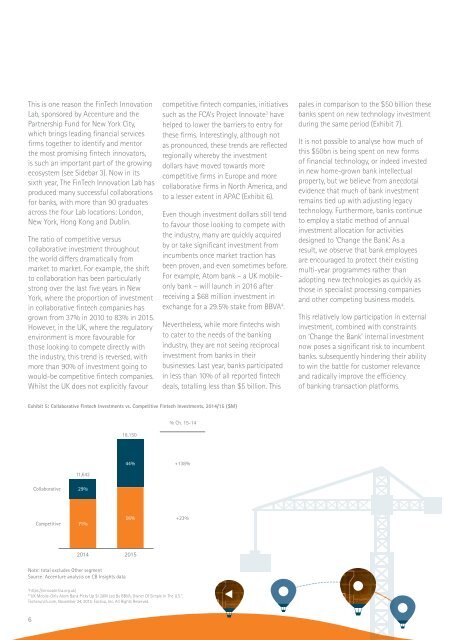Fintech and the evolving landscape
1VmrhLi
1VmrhLi
Create successful ePaper yourself
Turn your PDF publications into a flip-book with our unique Google optimized e-Paper software.
This is one reason <strong>the</strong> FinTech Innovation<br />
Lab, sponsored by Accenture <strong>and</strong> <strong>the</strong><br />
Partnership Fund for New York City,<br />
which brings leading financial services<br />
firms toge<strong>the</strong>r to identify <strong>and</strong> mentor<br />
<strong>the</strong> most promising fintech innovators,<br />
is such an important part of <strong>the</strong> growing<br />
ecosystem (see Sidebar 3). Now in its<br />
sixth year, The FinTech Innovation Lab has<br />
produced many successful collaborations<br />
for banks, with more than 90 graduates<br />
across <strong>the</strong> four Lab locations: London,<br />
New York, Hong Kong <strong>and</strong> Dublin.<br />
The ratio of competitive versus<br />
collaborative investment throughout<br />
<strong>the</strong> world differs dramatically from<br />
market to market. For example, <strong>the</strong> shift<br />
to collaboration has been particularly<br />
strong over <strong>the</strong> last five years in New<br />
York, where <strong>the</strong> proportion of investment<br />
in collaborative fintech companies has<br />
grown from 37% in 2010 to 83% in 2015.<br />
However, in <strong>the</strong> UK, where <strong>the</strong> regulatory<br />
environment is more favourable for<br />
those looking to compete directly with<br />
<strong>the</strong> industry, this trend is reversed, with<br />
more than 90% of investment going to<br />
would-be competitive fintech companies.<br />
Whilst <strong>the</strong> UK does not explicitly favour<br />
competitive fintech companies, initiatives<br />
such as <strong>the</strong> FCA’s Project Innovate 3 have<br />
helped to lower <strong>the</strong> barriers to entry for<br />
<strong>the</strong>se firms. Interestingly, although not<br />
as pronounced, <strong>the</strong>se trends are reflected<br />
regionally whereby <strong>the</strong> investment<br />
dollars have moved towards more<br />
competitive firms in Europe <strong>and</strong> more<br />
collaborative firms in North America, <strong>and</strong><br />
to a lesser extent in APAC (Exhibit 6).<br />
Even though investment dollars still tend<br />
to favour those looking to compete with<br />
<strong>the</strong> industry, many are quickly acquired<br />
by or take significant investment from<br />
incumbents once market traction has<br />
been proven, <strong>and</strong> even sometimes before.<br />
For example, Atom bank – a UK mobileonly<br />
bank – will launch in 2016 after<br />
receiving a $68 million investment in<br />
exchange for a 29.5% stake from BBVA 4 .<br />
Never<strong>the</strong>less, while more fintechs wish<br />
to cater to <strong>the</strong> needs of <strong>the</strong> banking<br />
industry, <strong>the</strong>y are not seeing reciprocal<br />
investment from banks in <strong>the</strong>ir<br />
businesses. Last year, banks participated<br />
in less than 10% of all reported fintech<br />
deals, totalling less than $5 billion. This<br />
pales in comparison to <strong>the</strong> $50 billion <strong>the</strong>se<br />
banks spent on new technology investment<br />
during <strong>the</strong> same period (Exhibit 7).<br />
It is not possible to analyse how much of<br />
this $50bn is being spent on new forms<br />
of financial technology, or indeed invested<br />
in new home-grown bank intellectual<br />
property, but we believe from anecdotal<br />
evidence that much of bank investment<br />
remains tied up with adjusting legacy<br />
technology. Fur<strong>the</strong>rmore, banks continue<br />
to employ a static method of annual<br />
investment allocation for activities<br />
designed to ‘Change <strong>the</strong> Bank’. As a<br />
result, we observe that bank employees<br />
are encouraged to protect <strong>the</strong>ir existing<br />
multi-year programmes ra<strong>the</strong>r than<br />
adopting new technologies as quickly as<br />
those in specialist processing companies<br />
<strong>and</strong> o<strong>the</strong>r competing business models.<br />
This relatively low participation in external<br />
investment, combined with constraints<br />
on ‘Change <strong>the</strong> Bank’ internal investment<br />
now poses a significant risk to incumbent<br />
banks. subsequently hindering <strong>the</strong>ir ability<br />
to win <strong>the</strong> battle for customer relevance<br />
<strong>and</strong> radically improve <strong>the</strong> efficiency<br />
of banking transaction platforms.<br />
Exhibit 5: Collaborative <strong>Fintech</strong> Investments vs. Competitive <strong>Fintech</strong> Investments, 2014/15 ($M)<br />
18,150<br />
% Ch. 15-14<br />
44%<br />
+138%<br />
11,642<br />
Collaborative<br />
29%<br />
Competitive<br />
71%<br />
56%<br />
+23%<br />
2014<br />
2015<br />
Note: total excludes O<strong>the</strong>r segment<br />
Source: Accenture analysis on CB Insights data<br />
3<br />
https://innovate.fca.org.uk/<br />
4<br />
“UK Mobile-Only Atom Bank Picks Up $128M Led By BBVA, Owner Of Simple In The U.S.”,<br />
Techcrunch.com, November 24, 2015. Factiva, Inc. All Rights Reserved.<br />
6


